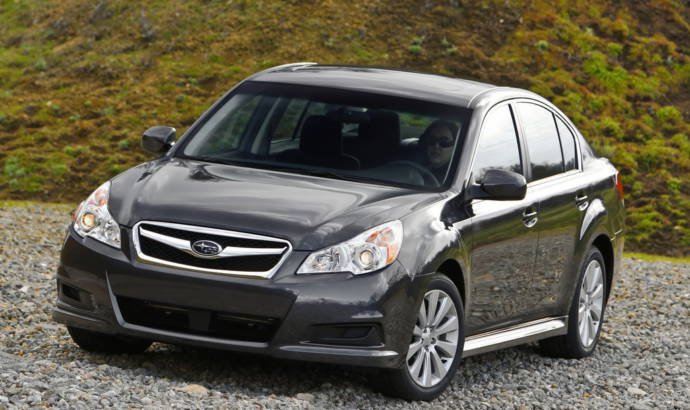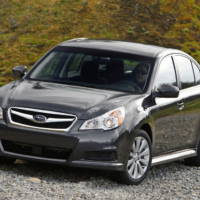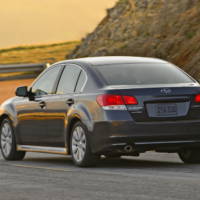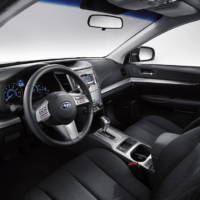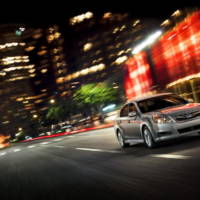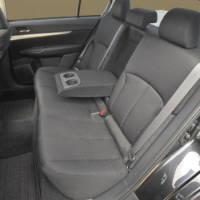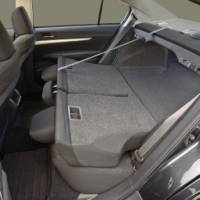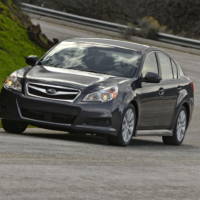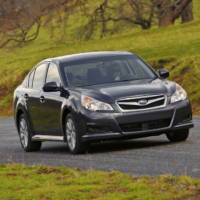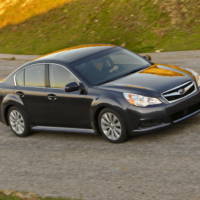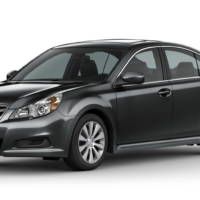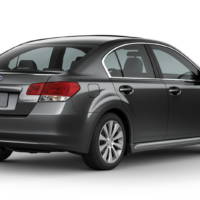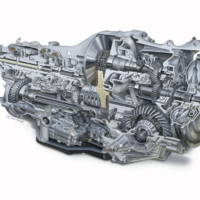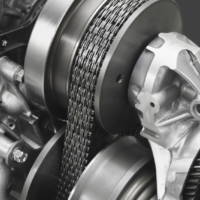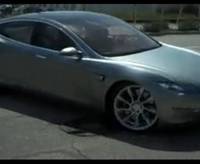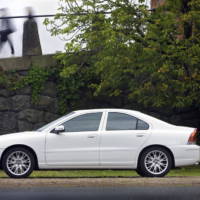The Tokyo car manufacturer revealed today details and images of their 2010 Subaru Legacy that will have its official introduction at the New York Auto Show in April. The new Legacy is now longer wider and higher comparing to its previous version with also more luggage room in the trunk. There are three types of motorisation available for the 2010 Subaru Legacy that range from the 170 horsepower in the Legacy 2.5i with 6-speed manual / CVT transmission to the 265 horsepower powerplant with 6-speed manual gearbox found in the 2.5GT version. The 2010 Subaru Legacy 3.6R is also said to be present at New York in April that will feature the 3.6 liter Boxer engine outputting 256-hp and fitted with the 5-speed automatic transmission. Details regarding the 2010 Subaru Legacy price have not been yet revealed.
Subaru press release:
Tokyo, March 31, 2009 – Fuji Heavy Industries Ltd. (FHI), manufacturer of Subaru automobiles,
today announced the unveiling of the all-new Legacy sedan (U.S. specifications) at the New York
International Auto Show (press days on April 8 and 9, open to the public from April 10 through 19).
The new sedan will be introduced in the U.S. market as the 2010 Legacy.
In the 20 years since the introduction of the first Legacy model, FHI has remained committed to
enhancing both sporty handing and safety technology and has made significant improvements to
this fifth-generation Legacy sedan. Featuring Subaru’s core technology, symmetrical All-Wheel-
Drive (AWD), along with FHI’s original Horizontally-Opposed (BOXER) engine, the all-new
Legacy sedan draws together superb driving performance and vital environmental considerations,
while providing increased room and unparalleled comfort. The new Legacy sedan also features
the new Subaru Lineartronic™ CVT (continuously variable transmission) and a new engine cradle
design.
[Note: Information provided in this release is based on U.S. specifications.]
Larger midsize package for all occupants to enjoy
On an all-new platform, the new Legacy sedan offers roominess comparable to mainstream
midsize sedans in the North American market that are built around comfort and space.
– The new Legacy sedan is 35 mm longer, 90 mm wider and 80 mm higher than the
previous model. While its overhang dimensions are shortened by 45 mm, its wheelbase is
expanded by 80 mm, allowing for additional rear legroom.
– The trunk is enlarged and offers larger volume than the previous model, while its opening
is also wider and placed lower for easier access and utility. The trunk will accommodate
four nine-inch golf bags.
Exterior design
Based on the design concept of Presence, the new Legacy embodies advances in the Legacy sedan
styling, combining boldness and beautility into its sporty look.
– Overall exterior design, accentuated by sharp edges and character lines, highlights the
vigor of the new Legacy.
– Prominently projected wheel arches express the power running through the Symmetrical
AWD system, enhancing the presence of the Legacy.
– A distinctive wing-shape embellishment on the front grille shows the Subaru brand
identity, and the front bumper designs accentuate flat horizontal surfaces. Embellished
with solidly-designed headlamps, the front face of the Legacy makes a bold, powerful
statement.
– The cabin with dynamic design and a shorter deck give the vehicle a sporty appeal, while
volume and power of the vehicle are expressed in the rear-end design, rounded and
capacious and framed by the combination lights.
– Moldings around the windows accentuate the sleek design of cabin area with a quality feel.
Interior designs
For interior design development, Subaru focused on the key words, Active and Quality Feeling. A
new interior design echoes the dynamic exterior lines and shapes and creates a more spacious
cabin.
– The new instrument panel, accentuated by sharp edges, creates the impression of more
laterally-opened space in the front
– A sense of powerful presence and fine quality is expressed in the center console shapes
and in the decorative hairline finish on the surfaces of the console.
– The incorporation of a new electronic parking brake eliminates the need for a side break
lever and creates more space for the center console. The center console features two cup
holders arranged side by side, and the console box and arm rest are enlarged to provide
more inside storage space.
– Both front seats excel in comfort and support, and their stitched fabric emphasizes the
Legacy’s sporty look. A 10-way driver’s seat, with power lumber support adjustment, and
4-way power front passenger seat are available on premium-grade models.
– A newly-designed 3-spoke steering wheel provides a sporty feeling and comes with audio
and cruise control buttons. Steering wheel paddle shifters are featured on models with
automatic transmissions and Lineartronic™ CVT.
– The four dials on the instrument panel are outlined with aluminum-steam-plated meter
rings, and, for immediate reading, their illuminated backgrounds are always on. A multi-
information display with average-MPG indicator is located in the center of the dashboard.
Engine and transmission
The new Legacy sedan is powered by improved Boxer engines that provide outstanding fuel
economy. Three engine types are available in the U.S. market.
Legacy 2.5i
Engine displacement: 2,457cc
Max. output/ max. torque: 170 hp@ 5,600rpm/ 170 lb-ft.@ 4,000rpm
Transmission: 6-speed manual / Lineartronic™ CVT
Legacy 2.5GT
Engine displacement: 2,457cc
Max. output/ max. torque: 265 hp@ 5,600rpm/ 258 lb-ft.@2,000– 5,200rpm
Transmission: 6-speed manual
Legacy 3.6R
Engine displacement: 3,630cc
Max. output/ max. torque: 256 hp@ 6,000rpm/ 247 lb-ft.@ 4,400rpm
Transmission: 5-speed automatic
2.5-liter SOHC engine
– Employing a resin-based intake manifold, the engine is now lighter in weight and
improves low speed range torque. Additionally, better fuel economy is achieved through
engine cooling performance improvement in an engine head. Optimizing the specifications
of its catalyst, the engine offers outstanding exhaust gas control.
2.5-liter DOHC Turbo engine
– Design changes in the turbocharger have raised performance and lowered emission levels.
– Peak torque is generated at levels as low as 2,000 rpm, and sustained smoothly at higher
rpm ranges.
– The turbocharger unit is placed directly under the forward part of the crankshaft. This
layout shortens the distance that exhaust gas must travel, increases response with smoother
turbocharging and improves filtering of emissions. It also helps to lower the vehicle’s
center gravity, which results in more efficient weight distribution.
3.6-liter DOHC engine
– Featuring the same external dimensions as the earlier 3.0-liter engine, the new 3.6-liter
engine is compact and lightweight.
– The Active Valve Control System (AVCS), which incorporates variable valve timing on
both the intake and exhaust valves, optimizes power delivery across the engine’s speed
range while helping to reduce emissions. Not only does the 3.6 engine offer greater
performance than the previous 3.0-liter unit, but it does so economically by using regular
grade fuel. The 3.0-liter engine required premium grade.
The Subaru Lineartronic™ CVT (continuously variable transmission) offers superb driveability
and fuel economy.
Lineartronic™ CVT
– The 2.5-liter naturally-aspirated engine model is equipped with a chain-type CVT, the
world’s first* longitudinally mounted CVT system for AWD production vehicles.
(*Claim based on Subaru research.)
– Chain-type CVTs boast higher torque delivery capacity and lower friction, helping provide
better fuel efficiency than belt-type CVTs. The Lineartronic™ CVT employs smaller
pulley cores, which makes the unit compact. And due to the significant size difference
between the smallest and largest pulley core diameters, the CVT provides infinite
variability between the highest and lowest available ratios, helping to keep the engine
operating in its most efficient range.
– With a perfect balance of torque delivery and engine revolutions, the Lineartronic™ CVT
provides smooth acceleration with a linear feeling in response to the accelerator pedal.
– The manual mode of the Lineartronic™ CVT, which a driver can choose to engage, uses
six pre-selected steps that allow the driver to "shift" manually using steering wheel paddle
controls. The shift response is always quick and smooth, comparable to the conventional
sports AT models.
Five-speed AT
– Fuel economy is improved through the reduction of friction and weight in the AT unit.
Six-speed MT
– For the first time in the U.S. market, the six-speed manual transmission is offered with the
2.5-liter non-turbo Legacy model. The new 6MT provides excellent fuel economy and
improved driveability, as well as quieter rides in high-speed ranges, thanks to its wider
ratio coverage.
– The compact design of the modified 6-speed transmission for turbo engine models is made
possible by optimizing the gear layout. This unit is also more than 25 kg lighter than the
previous unit.
Chassis
A new engine cradle design not only helps reduce noise and provides more refined ride and
stability but also improves front impact safety.
– The engine is mounted to the cradle frame, no longer installed on the chassis. The cradle
system supports the engine on four mounts that utilize cushioning rubber filled with liquid
material. By situating the engine in precise relation to the torque roll axis of the power unit,
the cradle system helps reduce vibration. In addition, the cradle layout allows the
turbocharger to be placed under the engine, which also helps reduce emissions.
– The MacPherson-type strut front suspension is mounted to the new engine cradle, further
improving steering response and handling and adding to overall rigidity. By changing the
layout of the stabilizers with increased diameter, roll rigidity is enhanced. This keeps the
stroke in line and improves ride comfort.
– A new double-wishbone rear suspension is mounted to the sub frame. All suspension links
and the rear differential are also mounted to the sub frame via bushes, while the link
bushes and shock absorber mounts are optimized to suit the new Legacy. Those
enhancements have significantly lowered overall noise levels.
– The 2.5-liter models feature standard 16-in. wheels, in optional aluminum alloy, and
205/60R16 tires. Premium-grade models are fitted with 17-in. alloy wheels with
215/50R17 tires. And the 2.5 turbo models are richly furnished with 18-in. alloy wheels
with 225/45R18 tires. On the Legacy 3.6-liter models, 17-in. alloy wheels with 225/50R17
tires are standard.
– All models are equipped with a standard 4-wheel disc Anti-lock Brake System (ABS),
which is augmented by Subaru’s Electronic Brake-force Distribution (EBD). Further
control is offered by Subaru’s Brake Assist safety system, which is available on all models.
– A new electronic parking brake eliminates the traditional parking brake handle and allows
for more storage space in the center console. An electronic Hill Holder System in the
parking brake is automatically activated if the vehicle stops on any hill with a slope of
more than 5%.
– Also standard on all models is Subaru’s exclusive Vehicle Dynamics Control (VDC)
system, which further enhances stability and traction control capacity by optimizing the
control time.
Body construction
– Use of high-tensile steel in critical body parts contributes to weight reduction and higher
overall rigidity. The engine cradle design enables more efficient impact absorption, while
keeping the body dimensions and weight virtually unchanged from the previous model.
– The hood and trunk lid are fitted with gas springs for greater ease of operation.
Safety
– In the event of front impact, the engine cradle frame folds inward and causes the power
unit to slide downward, thus creating greater zone of protection for the cabin space. In
combination with Subaru’s Ring-Shaped Reinforcement Frame safety structure, which is
designed for efficient absorption of impact, front impact safety has been significantly
improved.
– Two impact beams have been added in each of the front and rear doors. With an optimized
layout of its inner components, the door provides enough crushable space between its
panels to afford another level of protection to the vehicle’s occupants.
– Despite a shorter overhang, energy produced on rear impact is effectively absorbed
through optimized frame construction.
– All models feature front seat side impact air bags and side curtain air bags that insure
additional head protection for front and rear occupants. Intelligent dual-stage deployment
front air bags use sensors to detect both the presence and weight of the front passenger and
the driver’s distance from the steering wheel. And for optimal protection of occupants, the
system determines deployment strength of front air bags. The side airbags and curtain
airbags are enlarged to further enhance passenger protection.
– Newly designed high-strength front seat frames and energy-absorbing headrests provide
enhanced protection against whiplash injury in a rear-end collision.
Other equipment
– Headlights are governed by an automatic lights-on and -off function that responds to
specific driving situations.
– A 60/40 split fold-down rear seat creates a wider passage to the truck compartment.
– A cup holder inside the rear seat armrest comes standard.
– Premium grade models offer additional comfort and convenience options, including a
Harman-Kardon® audio system and a power moonroof with a tilt-up and slide mechanism.
Major Specifications:
Body Styles 4-door, 5-passenger
Body Size (length/width/height) 4,735 X 1,820 X 1,505 mm
Wheel Base 2,750 mm
Track (front/rear) 1,565/1,570 mm
Specifications are preliminary and subject to change.
About Fuji Heavy Industries Ltd.
Fuji Heavy Industries Ltd. (FHI), the maker of Subaru automobiles, is a leading manufacturer in Japan
with a long history of technological innovations that dates back to its origin as an aircraft company. While
the automotive business is a main business pillar, FHI’s Aerospace, Industrial Products and Eco
Technologies divisions offer a diverse range of products from general-purpose engines, power generators,
and sanitation trucks to small airplanes, crucial components for passenger aircrafts, and wind-powered
electricity generating systems. Recognized internationally for its AWD (all-wheel drive) technology and
Horizontally-Opposed engines in Subaru, FHI is also spearheading the development of environmentally
friendly products and is committed to contributing to global environmental preservation.

